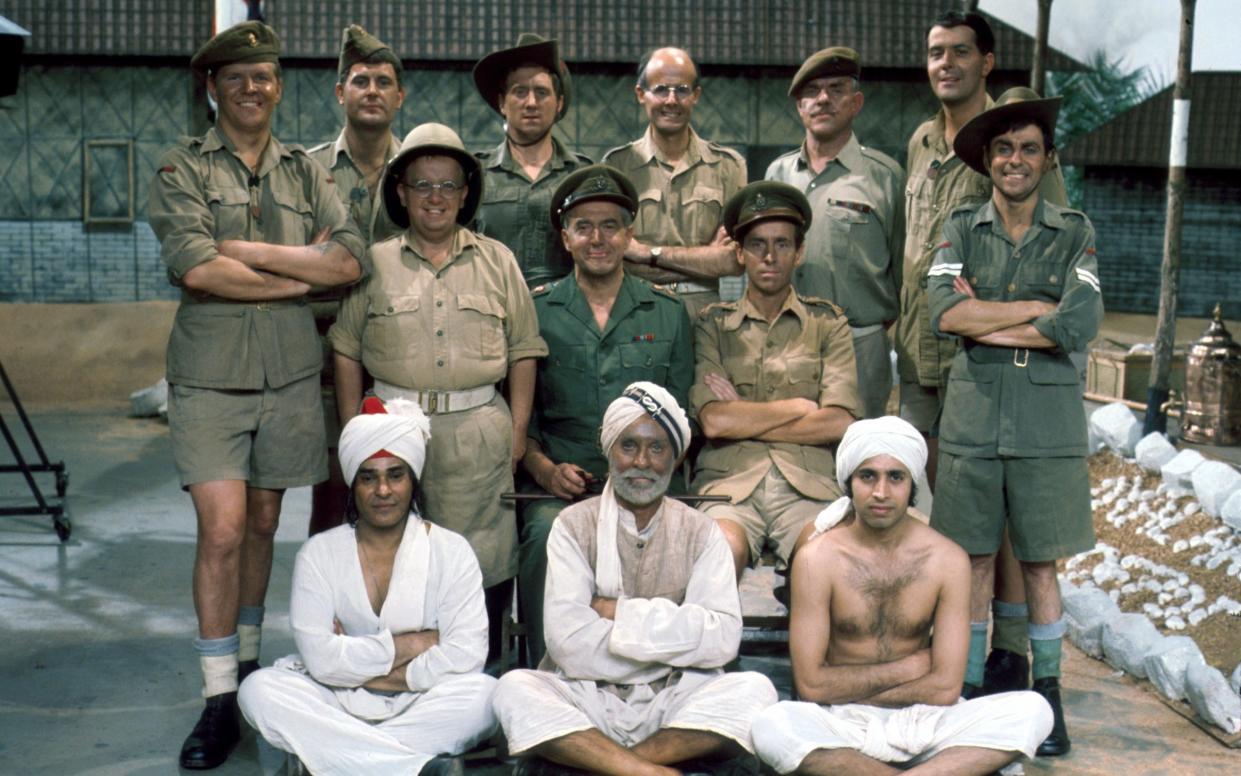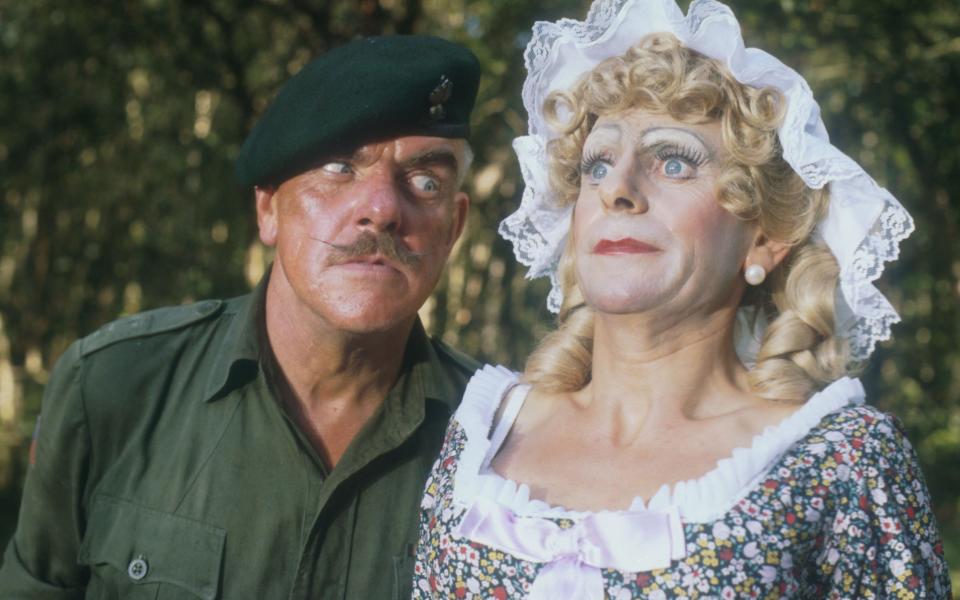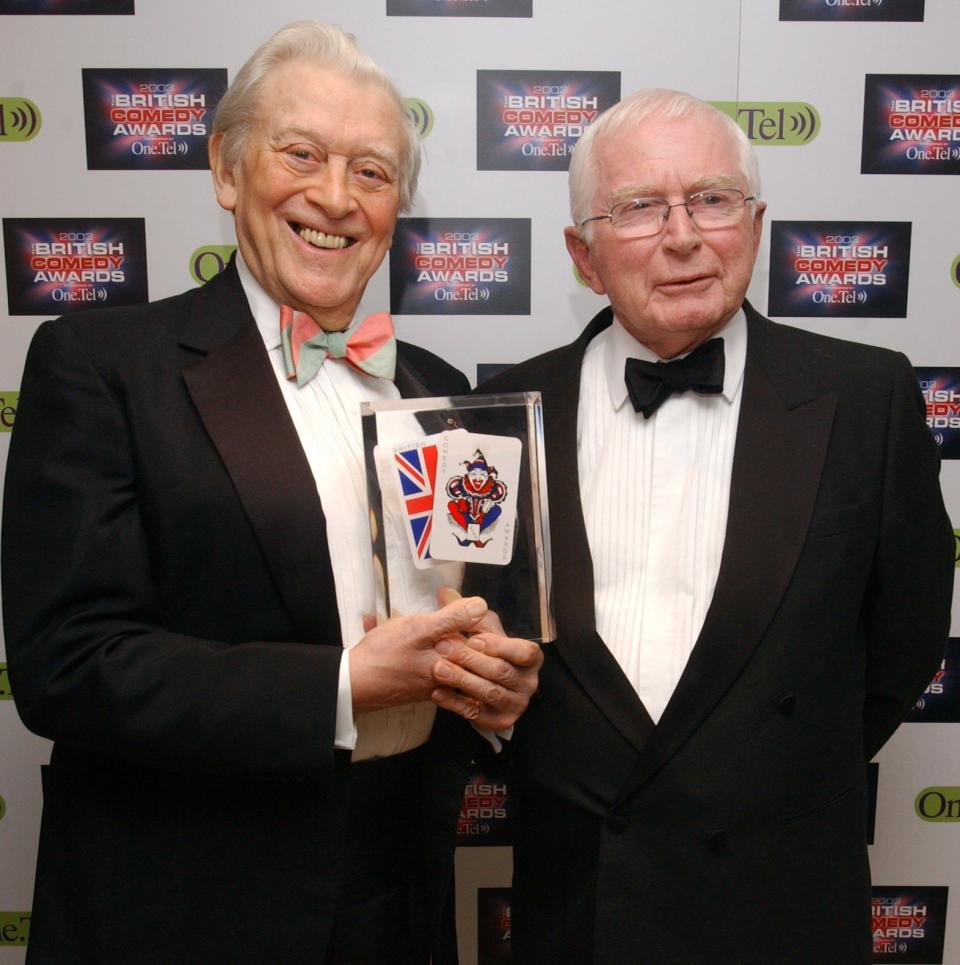‘To treat it as an object of shame is just wrong’: 50 years of It Ain’t Half Hot Mum

“When you think of some of the stuff on TV these days, it’s hard to see why It Ain’t Half Hot Mum is seen as too offensive to be shown on the BBC,” says Melvyn Hayes. “Nobody swore, there was no rudeness and what we used to call ‘the coloured characters’ came out on top every time. I feel very privileged to have been a part of it.”
Fifty years ago this month, Hayes, now 89, appeared in the first episode of Jimmy Perry and David Croft’s sitcom as the cross-dressing Gunner “Gloria” Beaumont, an irredeemably effete member of a concert party of British squaddies stationed in India during the final months of the Second World War.
From 1974 until its final episode in 1981, it was one of the most popular shows on TV, attracting between 15 and 17 million viewers each week. But unlike Jimmy Perry’s other great wartime-set sitcom, Dad’s Army, it has since been airbrushed from the BBC. While the latter is treated as a national treasure, It Ain’t Half Hot Mum is TV kryptonite.
Hayes tells me all eight series of It Ain’t Half Hot Mum have just finished broadcasting on an obscure station I’d never heard of until now. That’s TV, it turns out, is the go-to channel for those of you missing the politically incorrect content of yore such as The Benny Hill Show and Till Death Us Do Part.
Does It Ain’t Half Hot Mum deserve to be cancelled by the BBC? Certainly the fact that the show’s leading Indian character, the concert party bearer Rangi Ram, was played by a white actor (Michael Bates) in “brown face” is beyond the pale in 2024. (It’s worth mentioning that, as late as the noughties, Little Britain used “blackface” and was dropped from iPlayer, Britbox and Netflix in 2020. Matt Lucas and David Walliams, who had previously apologised, doubled down with a further statement. “Once again we want to make it clear that it was wrong and we are very sorry.”)

Even during It Ain’t Half Hot Mum’s 1970s pomp, it had its detractors. In 1979, cultural theorist Professor Stuart Hall (not to be confused with the disgraced It’s a Knockout presenter) and actress Maggie Steed made a film for BBC Two called It Ain’t Half Racist, Mum, skewering the racial slurs that were prevalent in TV and using clips from the sitcom to make the point that the racial stereotypes in such shows effectively made Britain more racist. “Jokes can strengthen our prejudices even while we are laughing at them,” said Hall.
Hayes says: “None of the Indian people I’ve spoken to found it offensive. In fact, they thought of it as their sitcom because it was the only time they’d hear Urdu or Hindi spoken on British TV. They thought of it as their show.”
Among the champions of It Ain’t Half Hot Mum is Sanjeev Bhaskar, Ealing-born actor of Indian heritage famed for his droll take-downs of racist attitudes towards Indians in such comedy shows as Goodness Gracious Me and The Kumars at No 42. “I’ve always defended It Ain’t Half Hot Mum,” he told fellow actor Rob Brydon’s podcast in 2022. “My argument was always that first of all, Michael Bates could speak Urdu fluently. And secondly, within that programme, the character he was playing wasn’t the butt of the joke… He [Rangi Ram] was the fixer, he was the one who sorted things out.”
But surely an Indian actor could have been found to play Rangi Ram? When I put this to Jimmy Perry during an interview a few years before his death in 2016, he retorted: “At the time, we found it impossible to find an Indian actor who could perform the role, to be perfectly honest.” In a country of 500 million people? “Yes. But Michael was ideal for the role. He was born in India, spoke fluent Urdu, had been an officer in the Gurkhas and he’d served with the Chindits behind Japanese lines in Burma.”

Then there is the show’s homophobia. Perry was equally sanguine about that in the sitcom. “People complain that the language was homophobic, and it was, but it was exactly how people spoke. And I should know – I was in a Royal Artillery concert party that travelled around India. We had a sergeant major who hated us. He’d say: ‘No man who puts on make-up and ponces about on a stage is normal – what are you?’ And we would reply: ‘We’re a bunch of poofs!’ And those experiences are ones that enabled me to write It Ain’t Half Hot Mum.”
The sitcom’s drama is spurred by Windsor Davies’s sergeant major, a hardened professional soldier among a party of effete conscripts. He wants to get them sent to the jungle where they can fight the Japanese and become real men. They, like British versions of Herman Melville’s Bartleby, would prefer not to.
In the case of Gunner “Gloria” Beaumont, he’d prefer to sing, dance and wear outfits that make him look, to my eyes at least, as a prototype for Turner-winning sculptor Grayson Perry’s alter ego, Claire. “I wasn’t gay,” says Hayes. “But I was certainly very, very effete.”
He tells me that John Inman, famed for his performance as gay menswear salesman Mr Humphries in the sitcom Are You Being Served?, was originally earmarked for the role. “John would have been great of course. He was a wonderful actor.” I mention to Hayes that for many years I thought Inman’s performance only served to entrench homophobic stereotypes, but I was disabused of that view when Doctor Who showrunner Russell T Davies wrote to me after the publication of my book about sitcoms, Mrs Slocombe’s Pussy, saying how much Mr Humphries meant to him as a boy struggling with his sexuality. The moral? Just possibly that a dodgy-seeming comic stereotype can be a force for good.
Arguably, then, the BBC could broadcast It Ain’t Half Hot Mum. Not to endorse its racism or homophobia, but to show a sitcom that reflects the times in which it was made and, more importantly, what it meant to those all too readily depicted as mere victims of its putative bigotry. Hayes goes further: “It was accurate about what happened. Both David and Jimmy had served in India and knew what they were talking about. It tells the truth about what it was like during the war in India. Or one part of the truth anyway. Isn’t that worth showing?”
When Windsor Davies died in 2019, Hayes said it was a shame the BBC could not bring itself to screen an old episode of It Ain’t Half Hot Mum to honour his friend. “They could have bleeped out ‘load of poofs’ or put up some disclaimer, but to ignore it completely, to take it off air and treat it as an object of shame was just wrong. It deserves better than that,” Hayes says now. He adds with a laugh: “And I’m not just saying that because of the repeat fees I’d get!”
Stuart Jeffries is the author of Mrs Slocombe’s Pussy: Growing Up in Front of the Telly (Flamingo)
